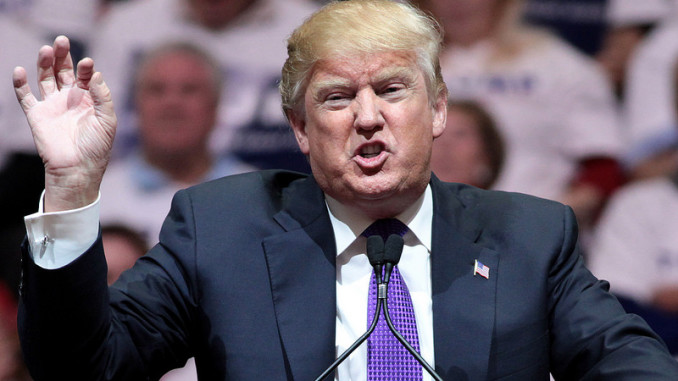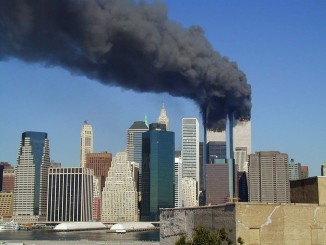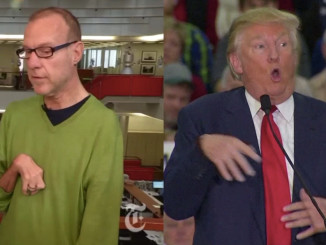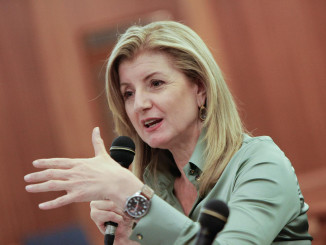
An expanded, revised version of this article is now available in the new book: The Media Versus the Apprentice: The Devil Mr. Trump.
MEDIA MEME:
During his campaign, Trump pledged to violate the Geneva Convention: he promised to ruthlessly murder the wives and relatives of terrorists, even their innocent children and babies.
WHAT ACTUALLY HAPPENED:
Trump used the expression “take out their families.” Journalists construed this as meaning murder even the most innocent relatives of alleged terrorists. But actually, Trump used the same ordinary expression on other occasions to mean: do something about them, defeat them, or remove them from somewhere. He never said that he would kill innocent relatives of terrorists. He even denied it.
On December 2, 2015, Donald Trump was interviewed on the morning television program Fox and Friends. The hosts asked about the war on terror and civilian casualties, “collateral damage” in war. Trump answered:
“I would do my best; absolute best. I mean, one the of the problems that we have, or one of the reasons we’re so ineffective is, you know, they’re trying to, [the terrorists] they’re using them [civilians] as shields. It’s a horrible thing. They’re using them as shields.”
Two of the hosts agreed, and Trump continued:
“But we’re fighting a very politically correct war. And the other thing is, with the terrorists: You have to take out their families. When you get these terrorists, you have to take out their families. They care about their lives. Don’t kid yourself. But they say they don’t care about their lives. You have to take out their families.”
Since the hosts had asked about civilian casualties, then it seemed that Trump was saying that in order to kill terrorists it’s necessary to murder their families too. Three times he said: “take out their families.”
Promptly, multiple media outlets complained. The television show, Inside Edition, distributed by CBS, sounded the alert: “Trump is at the center of a new furor today, after calling for the U.S. to target the families of terrorists.”
On The Young Turks, on YouTube, John Iadarola complained about how the interviewers in Fox had just moved along the interview with Trump “as if he hadn’t said anything about killing the innocent families of terrorists.”
However, Iadarola also pointed out the apparent contradiction in what Trump actually said. He paraphrased Trump: “Oh, I would do my best, I would do my best to not kill innocents; oh by the way, I’m also intentionally gonna try to kill the families of terrorists.” Iadarola called it Trump’s “policy.”
Still, regarding the terrorists, the hosts of The Young Turks admitted that President Obama himself: “He is hitting them hard. He is bombing them hard.” Cenk Uygur added: “And by the way he is killing their families.” The two other hosts agreed: “Yes, he is killing them,” “Of course.”
Yet the program, their outrage, was not about any real, collateral murders by President Obama and the U.S. military—it was about what Trump had said, his words.
Then Ben Mankiewicz explained Trump’s rationale, his thoughts: “These guys [terrorists] are so evil, I am so determined to protect you—I’ll kill their families. That’ll make them hurt so much, because we would think: ‘Oh, well I don’t want my family killed,’ and he’s right to think they won’t want their families killed either. He actually has a, there’s a moment of humanity in there for Trump.”
For a moment it sounded as if he agreed with Trump.
But then John Iadarola tried to make it worse, to explain why Trump bothers him: “The idea that you would kill innocents is the most horrific thing supposedly that we can imagine. He says the solution is kill more innocents.”
However, Trump had not actually said that.
Cenk Uygur too tried to elaborate what Trump must have meant, to make it sound more awful: “Now, let’s break out ‘Family’ here, let’s be more specific. Babies, daughters, sons, grandmothers, moms, right? So that’s what Donald Trump is saying. Let’s kill their babies. Let’s kill their mothers. Let’s kill their grandfathers. Let’s butcher them all.”
But Trump didn’t actually say that.
Uygur insisted: “But he just said he’d murder their babies!”
As if that wasn’t enough, Uygur expanded, to make it even worse, more outrageous: “And maybe it’s not their babies. Maybe it’s somebody else’s babies. But so what? I’m going to be a tough guy, and the way I’m tough is by killing family members: aunts, uncles, moms, children, okay?”
In turn, CNN reported that “Donald Trump said Wednesday that he would kill the families of terrorists in order to win the fight against ISIS.” Note however, that Trump had not used the word “kill.”
Think Progress too sounded the alarm that Trump said “that the United States should kill the family members of ISIS terrorists in order to defeat the jihadist group, a tactic that would likely be considered a war crime.” The reporter explained the problem: “The purposeful murder of civilians during wartime is widely considered a crime against humanity.”
Note however, that Trump did not use the words “kill,” “murder,” or “war crime.”
December 4, 2015. Fox News. Sean Hannity asked Trump to explain what he meant by saying “take out” the families. Trump replied by giving an example about the destruction of the Twin Towers. Trump said that the terrorists
“put their wives on airplanes a day or two before, all going back except for one to Saudi Arabia, okay? They’re all going back to Saudi Arabia and they’re all going, in other words, they’re leaving. Those wives, I guarantee you, those wives knew every single thing that was going to take place.”
Trump’s example was utterly mistaken. According to the 9/11 Commission Report, none of the nineteen hijacker-terrorists had wives in the U.S. in the weeks or months prior to the attacks. Apparently only two of the hijackers were married, plus one had a girlfriend living in Germany. Still, Trump told Hannity (at 10:34):
“But they [the wives] went home; they knew exactly. And I say: Take them out, take them out. And I’ll tell you the thing: they [the terrorists] supposedly don’t care about their [own] lives, I disagree with that, I say they’re chicken and they do care about their lives. But supposedly they don’t care about their lives. But they do care about their families’ lives, okay?”
Trump insisted: “Take them out.” Sean Hannity then said: “I actually agree with you.”
Notice again Trump’s insistence on the expression: “Take them out.” He didn’t say shoot them, bomb them, murder them, or kill them. Why didn’t he say that?
December 6, 2015. John Dickerson interviewed Trump on Face the Nation on CBS. Dickerson asked him: “going after the families, what does that mean?” Trump replied:
“Well, I would go after; well, at least I would certainly go after the wives who absolutely knew what was happening. And I guess, your definition of what I’d do, I’ll leave that to your imagination. But I will tell you, I will be very tough on families because the families know what’s happening. Even in this last instance [the murders at San Bernardino]…”
John Dickerson remarked that the terrorist’s sister “said she didn’t know what was going on.” Trump replied that he did not believe her and that
“I would go after a lot of people and I would find out whether or not they knew.”
On December 15, 2015, at a Republican debate in Las Vegas, Trump modified his previous claim about the wives of the terrorists of September 11. He now said that the terrorists’ friends, family, and girlfriends “were put into planes and they were sent back, for the most part, to Saudi Arabia. They knew what was going on. They went home and they wanted to watch their boyfriends on television.”
A writer for PolitiFact remarked that “Trump’s words might reflect some confusion with the hastily organized departures of members of Osama bin Laden’s extended family” soon after the destruction of the Twin Towers.
Also during the debate in Las Vegas, a college student asked a pre-recorded question: “Recently Donald Trump mentioned that we must kill the families of ISIS members. However this violates the principle of distinction between civilians and combatants in international law. So my question is: How would intentionally killing innocent civilians set us apart from ISIS?” Trump replied:
“we have to be much tougher, we have to be much stronger than we’ve been.” He said “ I would be very, very firm with families.”
Notice again that he didn’t say that he would murder them. He insisted that terrorists “may not care much about their [own] lives.” But “they do care, believe it or not, about their families’ lives.” The audience applauded.
What did he mean “much tougher”?
What did he mean by “very, very firm?”
On the Young Turks, Cenk Uygur explained what Trump must have meant. Being “very firm with their families—meaning you’ll kill them. Yeah. That’s what you said earlier, that’s what the student asked you about. You said you would kill their families.”
But Trump never actually said “kill.”
But at least Uygur asked: “What does that mean, ‘very tough’?” Uygur explained that Trump spoke like a mobster: “like the worst kind of mobsters, the worst kind of drug gangs.”
At a December event in Mesa, Arizona, Bill O’Reilly interviewed Trump. O’Reilly was skeptical of what Trump meant by “take them out.” He said that he didn’t believe Trump would “put out hits on women and children.” O’Reilly asked: “You’re going to assassinate them? [Or about a terrorist’s wife] You arrest her?” Trump replied:
“I would do pretty severe stuff.”
Then many people applauded. Note again that Trump sounded tough but he didn’t say shoot, kill, assassinate, etc. Yet that’s precisely the impression that journalists got. Ryan Lizza wrote a report in The New Yorker, in which he remarked: “I had never previously been to a political event at which people cheered for the murder of women and children.”
In Vox, an article was titled: “Donald Trump said he’d kill terrorists’ families at a rally. His crowd went wild.” The writer complained that Trump had no qualms about promising to commit war crimes.
Notice again that however bad Trump’s words sounded, journalists’ words were worse.
On the Fox Business Network, Trish Regan asked “What would that ‘severe stuff’ be?”
Republican strategist Gina Loudon answered: “This is Trump, classic Trump. Throwing the hail Mary pass, right? He does that, he gets all the headlines, and then he explains what he means. And I think that when it comes down to it he’ll be talking about doing some sensible punishment for conspiracy, which is something the American public is screaming for, especially in light of the San Bernardino shootings, in which, there’s just no way! Use your brain: that mom knew.” The terrorist’s mother lived in her son’s house but claimed that she didn’t know that he was making bombs in the garage.
However, Democratic strategist Emily Tisch Sussman said that Trump was talking about “killing innocent people.”
Then Trish Regan said: “but I don’t think he’s actually come out and said: ‘I would kill the mother, or I would kill the sister!”
Emily Tisch Sussman objected: “I don’t think we need to get that close into semantics…”
Regan insisted: “but that’s kind of important. … To be clear again, he actually hasn’t said specifically what he would do…”
On March 4, 2016, under increasing criticism, Trump clarified his views on handling terrorism in a statement to the Wall Street Journal. He said that as President he would
“use every legal power that I have to stop these terrorist enemies. I do, however, understand that the United States is bound by laws and treaties and I will not order our military or other officials to violate those laws and will seek their advice on such matters.”
On March 9, CNN’s Anderson Cooper interviewed Trump. Cooper asked whether Trump had reversed his position on “going after the families of terrorists.” Trump said no, but that:
“We have laws. We have to obey the laws.”
Cooper interrupted: “Killing the families of terrorists would be against the law.” Trump replied:
“I didn’t say kill. We have to go after them, though.”
Like other pundits, Cooper then suggested something crude: “What does that mean; kidnapping them?” News reporters often try to put awful ideas in a candidate’s mouth. Then if the candidate does not deny the offensive nonsense they propose, then the reporters say: ‘He did not rule out doing this.’ Trump just replied:
“We’re going to have to do something. And it’s the only way you’re going to stop it.”
Compare Trump’s generic, fair, but vague comment with Cooper’s gross suggestion: kidnapping. Again, Trump tried to sound firm:
“We have to play the game at a much tougher level than we’re playing.”
Cooper: “What does that mean though?” Trump answered:
“It means we have to expand those laws.”
Then again Cooper made a grotesque, repulsive suggestion: “What does that mean? Does that mean cutting off heads?”
Trump: “No, it doesn’t mean that. But it means we have to expand the laws.”
Now compare Trump’s actual claims with journalists’ claims.
Trump proposed to “take out their families,” “take them out,” “be very, very firm,” “do very severe stuff,” “go after them,” “do something,” “go after the wives who absolutely knew,” “play the game at a much tougher level,” and “expand the laws.”
But journalists and commentators instead said:
“Kill the families,” “murder,” “commit war crimes,” “kill the innocent families,” “kill more innocents,” “Let’s kill their babies. Let’s kill their mothers. Let’s kill their grandfathers. Let’s butcher them all,” “he said he’d murder their babies,” “kidnap families,” “cutting off heads,” etc.
And of course, they merely thought that they were clarifying Trump’s meaning. This same pattern led to the creation of the myth of Trump’s mandatory database to track all Muslim American citizens.
But wait, Trump had really said, again and again: Take them out. Didn’t that necessarily and clearly mean murder all the innocent relatives of terrorists?
No. As usual, reporters chose not to check whether a particular ordinary expression means anything other than its worst apparent meaning.
Actually, Trump used the same expression in other situations.
This fact struck me clearly in May of 2016, while watching television. Trump was still competing to become the nominee of the Republican party. But there remained two other Republican contenders: Senator Ted Cruz and Governor John Kasich.
CNN’s Anderson Cooper hosted Trump and his family at a town hall discussion in New York. At one point, Cooper asked Trump whether he would sometime soon change his general tone, that is, whether he would speak more properly to sound more presidential. Trump said it would be easy to do. Then Cooper asked why not do it? Trump replied:
“Because I have two more people I have to take out. And when I take them out, I will be so presidential you won’t believe it.”
Right then it struck me that this was the same expression Trump used for the families of terrorists. (And this thought stayed with me for months.) Yet nobody complained, in the news that night, or the next day, that Trump had openly threatened to assassinate Ted Cruz and John Kasich. Nobody said that.
I now looked for other examples.
March 13, 2016. Trump was interviewed by John Dickerson, on Face the Nation on CBS. Among other things, Trump spoke about an incident in one of his rallies in which the Secret Service found out that some protesters had brought tomatoes to throw at Trump. So he explained to Dickerson:
“And I said to the people before my speech started, if you see anybody with tomatoes, you got to take them out, folks. You got to take them out. And I think everybody understands that.”
The next day, nobody in the media, nobody at all, complained that Trump had ordered the Secret Service, or his fans, to murder protestors who brought tomatoes.
March 12, 2016. Trump was at a campaign rally that was being interrupted by several protestors. As security approached the protestors, Trump said:
“We don’t want to hurt the protesters, please. We don’t want to hurt the protesters. Be very gentle when you take them out, very, very gentle.”
Nobody complained that Trump had instructed security to gently assassinate the protestors.
March 11, 2016. St. Louis. Protestors interrupted the rally for several minutes, until security started removing them. Trump said:
“nobody wants to hurt each other anymore, right? And they’re being politically correct the way they take them out. So it takes a little bit longer.”
December 4, 2015. Campaign rally at Raleigh, North Carolina. Another group of protesters interrupted the event. As security was finally removing them, Trump complained:
“Why didn’t you take them out the nearest door instead of walking them through the whole place?”
Naturally, nobody complained that Trump had asked that the protestors be murdered by the nearest door.
July 11, 2015. Campaign rally in Phoenix, Arizona. Trump said:
“They will be in such trouble . . . ISIS, believe me, I would take them out so fast. You have to do it.”
Now of course, Trump did not mean that he would murder every person living in the Islamic State of Iraq and Syria. It did mean that some of them would die, but I think it more broadly meant that he would defeat ISIS.
Summing up, “We have to take them out” can mean several things, such as:
- We should assassinate them.
- We must defeat them.
- We need to capture them and detain them.
- We should remove them from where they are.
- We have to separate them from the general population.
- We must take them out of commission, neutralize them.
- We will senselessly murder all the relatives, even the innocent ones.
As usual, most commentators seized only the worst possible meaning, option #7, and used it to portray Trump as a dangerous madman.
Not only did they repeatedly emphasize the worst interpretation, but at no point did they even bother to acknowledge that the ordinary phrase “take them out” has several meanings, that some of them apply in the present context, and that Trump elsewhere used the expression in such ways.
After all, this is a guy who often referred to certain businessmen, contractors, and bankers as “Killers! They’re killers!” But he did not really mean that they murdered anyone.
In his 1997 book, The Art of the Comeback, Trump described smart women as “real killers.” In 2015 too, he praised executive businesswomen, saying “They’re killers, they’re phenomenal.”
On December 2016, Trump praised the individuals he had chosen to be in his Presidential Cabinet. He said they’re “the greatest killers you’ve ever seen.”
By “killers,” Trump meant ruthlessly successful and effective people. If the word “killer” does not necessarily mean what it literally says, then why must “take them out” mean assassinate innocent babies? Because it was Donald Trump who said it, and he was easy to caricature.
As usual, Trump was tone-deaf, headstrong, and politically incorrect. He was unapologetic and insensitive to the worst possible interpretation that could be applied to his careless words. Yet he never really pledged to butcher the innocent relatives of terrorists, as his critics said.
An expanded, revised version of this article is now available in the new book: The Media Versus the Apprentice: The Devil Mr. Trump.
Alberto A. Martinez is a professor of History at the University of Texas at Austin.
Next: The Muslim Ban




Prof. Martinez, I’m enjoying reading your articles. I’m kind of sensing a bit of defense of Trump. I hope it is just that you are pointing out the media’s slanted reporting, and you are in fact, unbiased in your reporting. I’m desperately seeking objective, unbiased reporting and it’s hard to trust any media source these days.